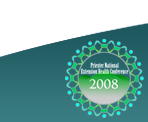
Call for Presentations
2008 Priester Call for Presentations (pdf) | 2008 Priester Call for Presentations Form (Word document)
Deadline for Submission of Proposals: November 30, 2007
Call for Presentations
Cooperative Extension professionals, their federal, state and local partners, and their students are invited to submit proposals related to the conference theme Building Healthy Communities, One Person at a Time. Proposals should be related to one of the three tracks described below.
Conference Tracks
The 2008 conference theme, Building Healthy Communities, One Person at a Time, celebrates Cooperative Extension's long history of promoting health and preventing disease for individuals of every age and background, in families of all types, living in rural, sub-urban, and urban communities. While the following tracks will allow participants to focus on areas of particular interest, participants may attend any presentations of their choosing.
This year’s Conference Tracks: Successful Aging, Global Health, and Growing Up Healthy IRL (in real life) focus on programs that address today's challenges. Our communities, families and youth are facing challenges such as baby boomer retirement, caregiving for aging parents, and other sandwich generation issues, new immigrant health, global consumer product safety, green living, and growing up healthy in a world of unprecedented affluence and communication technology, yet growing disparities among rich and poor. Participants are encouraged to take advantage of all conference tracks, since communities and professionals alike benefit from integrated programming.
- Successful Aging -- healthy aging, baby boomer challenges/opportunities, caregiving issues, lay caregiver or health care advocate issues, retirement planning, injury prevention and safety, universal design and housing, environmental health, violence prevention, chronic disease management, health promotion and health education, navigating the health care system, self-care, health care financial issues, health disparities, multi-cultural/diverse audiences, programs targeted for specific audiences, (e.g. ethnic, rural/urban audiences), community resources, green living, social marketing, worksite health and wellness, work/life balance, health care policy, mental health
- Global Health -- global warming, contaminated consumer products (imports), occupational health, environmental health and housing, emerging infectious diseases, food safety, health/well-being related sustainable development, chronic disease prevention and healthy lifestyle programs with cultural considerations, family/community interface, cultural competence, community resources, smart growth and global resource issues, health care system, financing and policy, learning from the world: successful programs from other countries, social marketing, programs targeted for multi-cultural/diverse audiences, (e.g. new immigrants, low English proficiency, ethnic, rural/urban), food security, community supported agriculture, health disparities, biosecurity, agriterrorism
- Growing up Healthy IRL (in real life) -- health issues for children and youth: healthy lifestyles, physical activity and fitness, obesity prevention/reduction, substance abuse prevention, gang prevention, children's environmental health, pregnancy prevention and responsible sexual behavior, green living, growing Extension's future work-force, multi-generational approaches, family and community resources, farm safety, mental health, injury prevention, health care and health policy, internet/cyber health and safety, social marketing, school wellness, after-school programs, camps, service-learning, reaching multi-cultural audiences
Conference Purpose
The Priester National Extension Health Conference offers professionals from Cooperative Extension, their federal, state, and local professional and community partners, and their students an opportunity to share health related educational programs and resources, applied research, and collaborative strategies. The annual conference is named in honor of retired CSREES National Program Leader Jeanne Priester. This year's conference is sponsored by the NC State University Family and Consumer Science Program, North Carolina Cooperative Extension (NC State University and NC A&T State University), and the United States Department of Agriculture-Cooperative State Research Education and Extension Service (USDA-CSREES).
Conference Objectives
Participants in the 2008 Priester National Extension Health Conference will:
- Increase knowledge of health trends, emerging health issues and the factors influencing the health status of our nation and the world
- Increase knowledge of current health education theory and research
- Increase knowledge of effective educational programs and health promotion practices derived from evidence-based research, including programs addressing diverse audiences and utilizing integrated programming
- Increase knowledge of collaborative partnerships, including those involving students, that have an impact on health education, promotion and policy
- Develop a network of colleagues and potential partners for initiating or expanding health initiatives within their areas of interest
- Explore activities that support work/life balance
- For students, gain experience in presentation skills and increase awareness of career paths
Conference Format
Proposals are invited for workshops, presentations, contributed papers and share fair displays. Contributed papers are designed to encourage student participation. Students may also participate as co-presenters. The proposal submission form follows. Submitted proposals should focus on programs that educate community members about individual behavior change strategies, health care access and quality, health policy, community health infrastructure, and/or health literacy. Programs in the areas of healthy lifestyles, chronic disease prevention and management, health literacy, environmental or occupational health, and health policy that relate to conference tracks are strongly encouraged. Workshops and presentations are sought that demonstrate innovative ideas, promising practices, and outcomes and impacts based on evaluation; that are designed to reach diverse or targeted audiences, for example: limited resource, low literacy, Hispanic/Latino, African-American, new immigrants, rural, urban; that are focused in a particular specialty area or that utilize integrated programming, i.e. that combine the efforts of Extension's traditional program areas of 4-H youth, family & consumer sciences, agriculture and natural resources, and community and rural development; that address critical and emerging issues; or that are community, needs, or assets-based. Workshops that provide skills development and that apply to multiple tracks are also sought.
- Workshop -- 60 minute sessions intended to share established and innovative curriculum, programs or evaluation resources, or community or policy development strategies through interactive activities and presentations.
- Presentation -- 30 minute sessions intended to present information, research or evaluation results in a lecture format with some time for discussion.
- Contributed Paper -- 10 minute presentation given during a session with other presenters of accepted papers. Presenters will be grouped by subject matter for session. (Intended for students – availability may depend on track.)
- Share Fair -- An opportunity for extension professionals to showcase successful programs, projects, research, evaluation strategies or resources. Skirted tables will be provided during this activity. Presenters are encouraged to share tabletop displays, sample materials, brochures, and contact information. Share Fair presenters will be expected to stand near their display during share fair.
Proposal Review Process and Criteria
Conference tracks are being planned by subcommittees. Subcommittee members include state and county Extension educators, university faculty, and their federal partners. Tracks may include presentations or workshops selected through the RFP process as well as sessions specifically planned by the subcommittee. In other words, subcommittees have the option of carving out a portion of the concurrent session time to plan and conduct a specific educational experience for conference attendees.
Proposals that are submitted will undergo a blind review using the following criteria.
Proposed Session:
- relates to the conference theme
- relates to one of the three identified tracks (or if skills-based, is relevant to health programming/research)
- has clearly defined learning objectives for conference participants
- describes a program/policy/activity that:
- addresses identified need in community
- uses a collaborative approach
- provides participants with skills, knowledge, and abilities
- engages participants in active learning
- has clearly stated participant outcomes
- presents information in a new or creative way
- provides information that is replicable and applicable to other areas or populations
- provides evaluation data (where applicable)
- is appropriate for conference audience and objectives
The quality of writing will be reviewed as well. The writing criteria include:
- grammar and spelling
- clear and concise writing
2008 Priester Award
Consider submitting your program/activity for the Priester Award. The Priester Award is made in honor of the accomplishments and contributions of Jeanne M. Priester to the Cooperative Extension System. Ms. Priester was a leader in advancing health education within CES during her tenure at the United States Department of Agriculture. The purpose of the award is to honor Extension programs that are positively impacting the health of people in communities across the United States and are expanding Extension's capacity to effectively provide health programs. The Priester award will recognize sound and innovative health education programs on the county/multi-county and state/multi-state level. Look for award nomination forms and procedures in January 2008 at http://continuingeducation.ncsu.edu/PNEHC.




